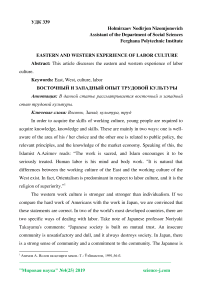Eastern and western experience of labor culture
Автор: Holmirzaev N.N.
Журнал: Мировая наука @science-j
Рубрика: Основной раздел
Статья в выпуске: 4 (25), 2019 года.
Бесплатный доступ
This article discusses the eastern and western experience of labor culture.
East, west, culture, labor
Короткий адрес: https://sciup.org/140264472
IDR: 140264472
Текст научной статьи Eastern and western experience of labor culture
In order to acquire the skills of working culture, young people are required to acquire knowledge, knowledge and skills. These are mainly in two ways: one is well-aware of the area of his / her choice and the other one is related to public policy, the relevant principles, and the knowledge of the market economy. Speaking of this, the Islamist A.Azimov reads: “The work is sacred, and Islam encourages it to be seriously treated. Human labor is his mind and body work. "It is natural that differences between the working culture of the East and the working culture of the West exist. In fact, Orientalism is predominant in respect to labor culture, and it is the religion of superiority.”1
The western work culture is stronger and stronger than individualism. If we compare the hard work of Americans with the work in Japan, we are convinced that these statements are correct. In two of the world's most developed countries, there are two specific ways of dealing with labor. Take note of Japanese professor Noriyuki Takayama's comments: “Japanese society is built on mutual trust. An insecure community is unsatisfactory and dull, and it always destroys society. In Japan, there is a strong sense of community and a commitment to the community. The Japanese is a nation that has long since been controlled, whether it controls or not. Anyone who has lost that confidence will no longer be able to re-join a team that has human relationships. If faith does not hurt, it can provide vital needs and fame. In Japan, there are many intellectuals who have a great deal of knowledge in the daily work of the day. Accordingly, in each institution, the decision goes from top to bottom. It is rarely possible for the staff to wait from above. Everyone entering large enterprises in Japan will be placed first in the lowest possible position, and his status will only grow rapidly after a certain period of time. The staff at the major Japanese institutions are in the 2-3 years. The new leader will not release the former employees.” 2
Now let's get acquainted with some of Ken Haiashibar's comments. As it is known, Xayashibara's 17 companies are specialized in the production of the necessary products for the pharmaceutical, chemical and food industries, as well as research and development of advanced technologies. "Today,- he says, - we are researching projects that will only last 10 or 20 years later. For four to five years, we are not interested in scientific research that will give results. If another company achieves better results in one direction, we will immediately stop our efforts. Because our goal is not just to profit. If someone else is more successful than you in a particular way, it would be wrong to do so.
Human beings can not realize their creative potential until they have two properties. First, you have to work hard to distinguish yourself from others. Second, you have to be very sensitive. Sensitivity at this point is to know the beauty of something you can see or to discern beauty in something that is not apparent beauty. The creative potential is the ability to combine existing knowledge and experience in different ways.”3
In the United States, operational plans are the best choice. They do not have projects for 10-20 years. Employee and employee loyalty to their business is linked to certain personal interests. In these conditions, the breakdown of some enterprises, the rise in unemployment, and the increase in the labor surplus are natural. In summary, learning different forms of labor attitudes and gaining the best of them will be the basis for the success of young workforce. In this regard, it will be beneficial to study the East and West in practice, and to embark on a major breakthrough. In short, the working culture has set high ethical and intellectual norms in the creation and consumption of material wealth.


